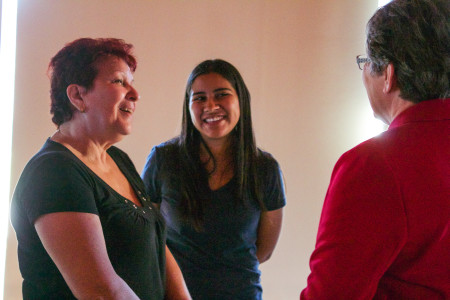As the longest-lasting trade embargo in modern history, the United States’ embargo against Cuba has been the source of international controversy for decades as well as a stubborn obstacle to Cuban development. On Wednesday, April 1, Carmen Nora Hernandez Chavez, a Cuban educator specializing in gender issues, came to campus with the Witness for Peace organization to speak in JRC 101 on “Cuba Today and Tomorrow.” Her talk was sponsored by Grinnell’s Peace and Conflict Studies program as well as the Rosenfield Program, and she spoke with the assistance of a translator.
Chavez began by describing the many issues that resulted both directly and indirectly from the embargo: poor public transportation, bad housing conditions, high costs for communications and technology, the instability of food supply, scarcity of medicine and limited availability of medical equipment. She explained that foreign subsidiaries of U.S. companies were not permitted to trade with Cuba, and that Cuba could not purchase goods with more than 10 percent U.S. parts. This posed a great difficulty for Cuba’s food supply because the country does not produce enough food for its entire population, Chavez said. Consequently, the country had to import about 16 percent of its food supply, which then makes up around 80 percent of the food that is given to the public in rations.
Chavez posited that although the current U.S. policies against cooperation with Cuba are named as an embargo by the American government, it is actually less of an embargo and more a blockade, in that the actions taken have extraterritorial
effects which impact Cuba’s financial and commercial relationship with the rest of the world. She pointed to one example where the use of the American dollar in international transactions was prohibited in 1962, thereby decreasing Cuba’s international purchasing power since the currency must be converted.
On December 17, 2014, President Obama announced that the United States would begin normalizing relations with Cuba, which comes after the United Nations and many other countries publicly spoke out against the embargo. Subsequently, U.S. citizen and USAID sub-contractor Alan Gross was released from prison in Cuba, along with an unnamed American intelligence agent. The United States released three Cuban agents from American prisons as a show of good faith.
According to Chavez, Cuba cannot yet open an embassy in the United States, as no American bank will open a banking account for a Cuban organization. Chavez noted that Cuba has already begun to see the benefits of Obama’s announcement—under authorization of increased telecommunication connections between the United States and Cuba, the Cuban telecommunications company has lowered the rates for calls to the United States.

“In general, the news on December 17 caused a lot of happiness in Cuba,” she said.
Chavez said that she hopes that the development of normalized relations between the two countries will begin to change the American perception of Cuba as “a hell.”
“We are a poor country, but every person has access to food every day. We also have guaranteed access to healthcare. We don’t live with the concern that we won’t have enough money to be able to afford to go to the doctor. We feel protected by the social security in our country,” Chavez said. “… [People] who don’t know the country think that we are a very submissive people and … that we don’t have the option of expressing our own opinions in our country. This shows a great lack of understanding of the Cuban reality. … We recognize that there are deficiencies in the administration of some agencies and that there is a lot of bureaucratic mismanagement, and these are things we would like to change.”
Chavez also said that she felt it was important to emphasize the positive person-to-person relationships between citizens of the two countries.
“I can assure you that in Cuba, there is no resentment against the American people. The North Americans that have been able to travel to Cuba can say that they’ve been very well received, that we open up our homes to them. Any person on the street will help them if they need directions or need any other help that we can give them,” Chavez said. “The Cuban government has always declared that the policies of the U.S. government are aggressive but that the people are not aggressive against Cuba. Even President Jimmy Carter was in Cuba after he left the presidency and he was very well-received, even at the Martin Luther King Center.”






















































